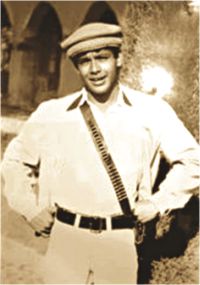Post Campus
Shafi Imam Rumi-
One in a 'Tale of Millions'
Asrar Chowdhury
Photos: Internet and Family Sources
| |
 |
| |
A young Rumi. |
After his birth (March 29, 1951), Murubbis prophesised he would follow his father and become an engineer. That probably would have been his fate. Securing the third position in the matriculation (SSC) in East Pakistan and then passing the intermediate (HSC), he enrolled at the Engineering College (BUET). With special permission, he attended classes at Economics at the University of Dhaka for a few days. He was also accepted to study engineering at the Illinois Institute of Technology, Chicago, USA. Classes were to start in the first week of September. Life could not have been better for Shafi Imam Rumi- the first born of Jahanara Imam and Shariful Alam Imam. Life seldom goes as planned. Rumi's is one in a Tale of Millions. The year was 1971. A nation stood at a crossroad in history. Like millions of others, Rumi was guided by fate to be a part in creating a State for the Bengali nation.
Being her first-born, Rumi was the apple of his mother's eyes. His first hurdle was to seek her permission and blessings to go to war. Shahid Janani, Jahanara Imam, recalled in her memoire Ekatturer Dinguli, it was impossible to resist a star debater in Rumi from not going to war. Rumi crossed the border on a second attempt and reached Melaghar, Agartala, Tripura- the training camp of Mukti Bahini of Sector 2.
Sector 2 linked Dhaka with Tripura via Comilla and Noakhali. Khaled Mosharraf (April 10- Sep 22, 1971) and ATM Haider (from Sep 22, 1971) were the Sector Commanders. Major Haider, or 'Sir' as he was fondly addressed, was the soul of Sector 2. By April, it was evident the Liberation War had become a peoples' war. History testifies, it is impossible to win against a peoples' war, History further testifies in a peoples' war guerilla operations (in various guises) become evident and an effective tool to push towards victory. 'Sir' Haider trained what later came to be known as Crack Platoon- the urban guerilla fighters of 1971. Rumi was one of the many fighters of Crack Platoon. The guerilla operations of Crack Platoon made it evident that the Bangladesh State was just a matter of time. The nation had gelled as one.
Rumi returned in the beginning of August with the objective of blowing up Siddhirganj power station to strangle the power supplies of Dhaka. On August 25, he was in the Dhanmondi Operation. The target was a Pakistani Army Camp. After a very successful operation, Rumi, Alam, Badi, Selim, Swapan and Kazi were returning in a car. In between Dhanmondi Road 4 and 5 they met check posts on both sides of the road. Rumi's bravery that day made him a hero. The Dhanmondi operation was significant. It exposed that the Pakistani Army was not impregnable.

During the surrender of 90,000 soldiers on December 16, 1971.
Alas! Wars are not the saga of heroes only. Villains are always very much alive. Following a tip, Rumi was arrested on the night of August 29-30. His Father, Shariful Imam, and his brother, Jami, were also arrested. The story does not end here. Rumi's comrades Jewel, Badi, Hafiz, Chullu, Azad, Belayet, Alvi, and even Altaf Mahmud were also arrested. Rumi and Badi tried to protect the others by taking full responsibility of the operation. Torture followed. Yahya Khan had just given a general amnesty. The bait did not work. Freedom Fighters bow down only to their Mother and Motherland. Amnesty rejected. On September 4 (most probably) Rumi and others met their fate- martyrdom. Years later, Shahid Janani, Jahanara Imam immortalised her first-born and gift to Bangladesh in the timeless Ekatturer Dinguli.
Rumi's engineering classes at Illinois were due to start in the beginning of September. He was indeed destined to become an engineer as his Murubbis had blessed after birth. Standing at a crossroad of time, Rumi and millions of others engineered the fate of a nation- freedom.
In the words of Rumi's comrade, Fateh Ali Chowdhury of Crack Platoon, "Very few nations have the privilege of fighting a liberation war. A true victory is only possible when the nation participates. In 1971, the whole nation gelled as one. We are happy to have been a part of this history."
Salute Rumi and the unknown Tale of Millions for leaving us indebted and resting on our shoulders a mantle to take Bangladesh to her rightful place on the world stage. Tomader Ei Reen Konodin Shodh Hobe Na!
(The author teaches economic theory at Jahangirnagar University and North South University.)
|
|
|
